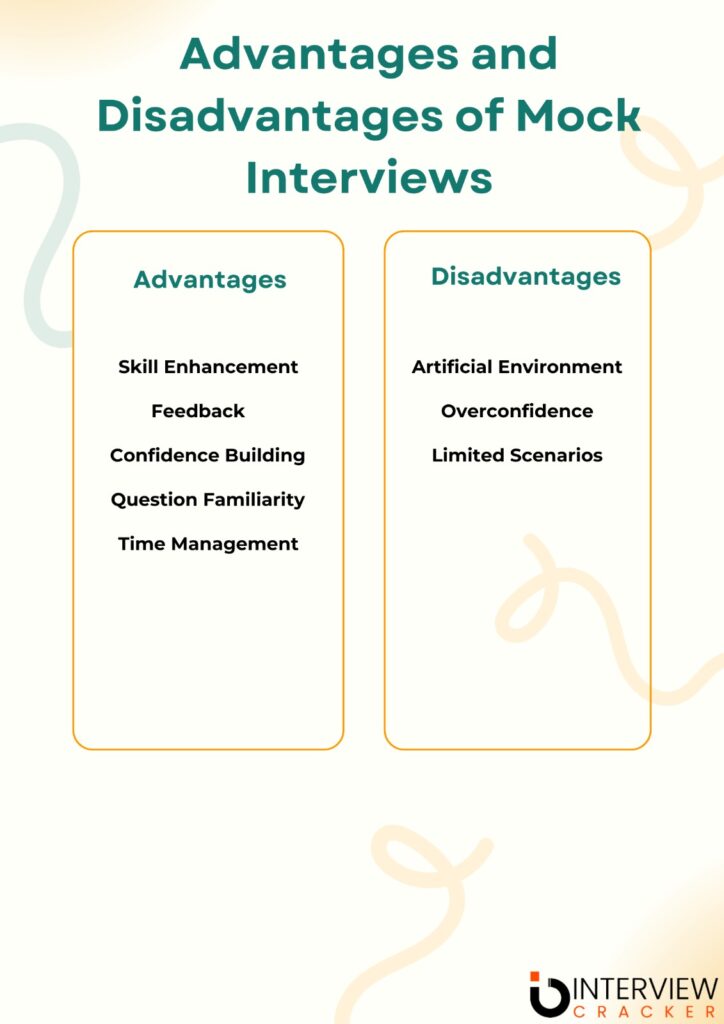What is a Mock Interview?
A mock interview is a simulated job interview that replicates the real thing as closely as possible. It’s a rehearsal before the actual interview with a potential employer. During a mock interview, you face an expert who acts as the interviewer and asks you questions typically asked in real job interviews.
Mock Interview Definition: A mock interview is a simulation of a real job interview used for training purpose.
What is the Purpose of a Mock Interview?
The primary purpose of a mock interview is to prepare you for the actual job interview. It helps you build confidence, refine your interview skills, and identify areas where you can improve. Mock interviews also help you become more comfortable with common interview questions and reduce anxiety.
Advantages and Disadvantages of Mock Interviews

Advantages:
Skill Enhancement: Mock interviews allow you to practice and enhance your interview skills.
Feedback: You receive constructive feedback from experienced professionals to help you improve.
Confidence Building: It boosts your confidence and reduces nervousness.
Question Familiarity: You become familiar with common interview questions.
Time Management: It helps you manage your time during interviews better.
Disadvantages:
Artificial Environment: It may not fully replicate the pressure of a real interview.
Overconfidence: Excessive practice can lead to overconfidence.
Limited Scenarios: Mock interviews may not cover all possible interview scenarios.
Suggested Read: Interview Cheat Sheet
How to Attend a Mock Interview?
Attending a mock interview is a straightforward process:
Find a Resource: Look for professional organizations, career centers, or mentors that offer mock interviews.
Schedule the Interview: Set a date and time for your mock interview.
Prepare Your Resume: Bring your resume and any relevant documents.
Dress Appropriately: Dress as you would for a real interview to get the full experience.
Participate Actively: Engage in the interview as if it were real.
Receive Feedback: After the mock interview, receive feedback and advice on how to improve.
How to Prepare for a Mock Interview?
Preparing for a mock interview is vital to make it effective:
Research the Company: Learn about the company where you are applying.
Know Your Resume: Be prepared to discuss your skills, experiences, and accomplishments.
Practice Answers: Practice answers to common interview questions.
Body Language: Work on your body language, including eye contact and posture.
Questions for the Interviewer: Prepare questions to ask the interviewer.
Mock Interview Materials: Bring copies of your resume, a notepad, and a pen.
Suggested Read: How to face an Interview
Tips for Successful Mock Interviews
- Mock Interview Preparation: Learn how to prepare effectively for mock interviews to make the most of your practice sessions.
- Interview Preparation Tips: Explore essential tips and strategies to enhance your interview preparation process.
- Common Interview Questions: Familiarize yourself with common interview questions and practice formulating articulate responses.
- Interview Techniques: Discover effective techniques for approaching different types of interview questions and scenarios.
- Mock Interview Examples: Gain insights into mock interview examples and learn from real-life scenarios.
Also Read: How to crack an Interview

Mock Interviews For Freshers
Mock interviews are particularly beneficial for freshers who have limited job interview experience. Here’s how to make the most of it:
Skill Development: Use mock interviews to develop essential interview skills.
Reduce Nervousness: Mock interviews can help reduce the anxiety of facing a real interview.
Feedback Utilization: Pay attention to feedback and work on your weaknesses.
Question Familiarization: Get comfortable with common interview questions.
Gain Confidence: Boost your self-confidence through practice.
Also Read: Secret to Master Fresher’s Resume
Why Mock Interview Test is Important?
Practice in a Controlled Environment: Mock interviews provide candidates with the opportunity to practice in a controlled environment that simulates real interview conditions. This allows candidates to become familiar with the interview process, including the types of questions asked and the overall flow of the interview.
Identification of Strengths and Weaknesses: Participating in mock interviews helps candidates identify their strengths and weaknesses in communication, presentation, and subject knowledge. Feedback from mock interviews allows candidates to recognize areas for improvement and tailor their responses accordingly.
Builds Confidence: Mock interviews help build confidence by providing candidates with the opportunity to practice articulating their responses and showcasing their qualifications. As candidates become more comfortable with the interview format, they are better equipped to present themselves effectively during actual interviews.
Refinement of Interview Skills: Through mock interviews, candidates can refine their interview skills, including active listening, effective communication, and the ability to think on their feet. Mock interviews offer a safe space for candidates to experiment with different interview techniques and strategies.
Preparation for Unexpected Questions: Mock interviews often include a variety of questions, including behavioral, situational, and technical queries. By participating in mock interviews, candidates can anticipate and prepare for a wide range of questions, including those that may catch them off guard during actual interviews.
Feedback and Constructive Criticism: Mock interviews provide candidates with valuable feedback and constructive criticism from interviewers or mentors. This feedback helps candidates understand their areas of improvement and provides actionable insights for enhancing their interview performance.
Reduces Interview Anxiety: Participating in mock interviews helps alleviate interview anxiety by desensitizing candidates to the stress and pressure of the interview process. The more mock interviews a candidate undergoes, the more comfortable they become with the interview experience.
Increases Interview Success Rate: Ultimately, mock interviews increase the likelihood of interview success by preparing candidates to present themselves confidently and effectively. Candidates who have undergone mock interviews are better equipped to navigate the interview process and make a positive impression on potential employers.
In summary, mock interviews are essential for candidates seeking to enhance their interview skills, build confidence, and increase their chances of success in real-world interview scenarios. Through practice, feedback, and refinement, candidates can position themselves as strong contenders for job opportunities.
Types of Mock Interviews
Mock interviews come in various forms to cater to different needs:
One-on-One Mock Interviews: A single interviewer conducts the interview, mimicking a real interview situation.
Panel Mock Interviews: Multiple interviewers may participate, providing diverse perspectives.
Group Mock Interviews: Several candidates are interviewed simultaneously to simulate group interview scenarios.
Video Mock Interviews: Conducted through video conferencing platforms, mimicking remote interviews.
Phone Mock Interviews: Focuses on phone interview skills, emphasizing verbal communication.
Also Read: The different types of Interviews

What are the Benefits of Mock Interview Sessions?
Now, let’s delve into the benefits of participating in mock interview sessions.
5 Benefits of Mock Interviews:
1. Improved Interview Skills
2. Reduced Anxiety
3. Enhanced Communication
4. Customized feedback
5. Confidence boost
Improved Interview Skills: Mock interviews help you refine your responses, ensuring you provide clear, concise, and relevant answers.
Reduced Anxiety: Repeated practice reduces interview anxiety, allowing you to perform better under pressure.
Enhanced Communication: Mock interviews teach you how to communicate effectively, a skill that is valuable both in interviews and in your future job.
Customized Feedback: Interviewers offer tailored feedback, helping you identify and rectify weaknesses in your interview technique.
Confidence Boost: As you become more comfortable with the interview process, your confidence grows, making you a more attractive candidate.
What are the Best Practices for Resume Writing and Mock Interview Sessions?
A crucial aspect of interview preparation is crafting a winning resume. Many interview preparation websites offer resume writing services to help you present your qualifications effectively. Your resume is often the first impression a potential employer has of you, so it’s essential to make it stand out.
Once your resume is polished, it’s time to move on to the mock interview session. These sessions simulate real interview conditions, helping you get comfortable with the process. Here’s how it works:
Realistic Scenarios: Mock interviews recreate the interview experience, complete with common questions and a professional interviewer.
Constructive Feedback: Interviewers provide feedback on your responses, body language, and overall performance, highlighting areas for improvement.
Confidence Building: Regular practice in mock interviews boosts your confidence and reduces nervousness when facing real interviews.
Contact Information: Include your name, phone number, email address, and LinkedIn profile (if applicable).
Objective Statement or Summary: Write a brief statement that summarizes your career goals and what you bring to the table as a candidate.
Education: List your educational background, including your degree(s), institution, graduation date, and any relevant honors or awards.
Work Experience: Detail your work history, starting with your most recent job. Include the job title, company name, dates of employment, and a bulleted list of key responsibilities and accomplishments.
Skills: Highlight your technical and soft skills, such as programming languages, software proficiency, leadership abilities, and teamwork.
Certifications and Training: Mention any certifications, workshops, or training programs that are relevant to the job you’re applying for.
Achievements and Accomplishments: Use quantifiable metrics whenever possible to demonstrate your achievements in previous roles.
References: Optionally, you can include references or mention that they are available upon request.
Also Read: 50 Resume Tips for Getting Jobs
Practice Mock Interview
Mock interviews are an invaluable tool for anyone preparing for a job interview. They offer the chance to refine skills, gain confidence, and improve your chances of success. By following the steps outlined here and utilizing different types of mock interviews, you can maximize your readiness for the real interview process. Remember, practice makes perfect, so embrace the opportunity to excel in your future interviews

What is the Difference Between a Mock Interview and an Interview?
The main difference between a mock interview and a real interview lies in their purpose and setting. A mock interview is a simulated practice session designed to mimic a real interview experience, allowing candidates to prepare and improve their interview skills in a safe environment. On the other hand, a real interview is an actual job or academic evaluation process where candidates are assessed for a specific position or opportunity. While a mock interview focuses on preparation and skill-building, a real interview carries the weight of potential employment or academic advancement.
Also Read: Free Mock Interview Practice Websites

